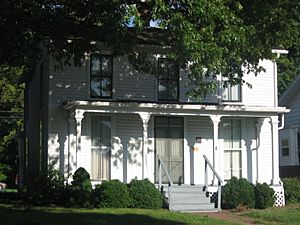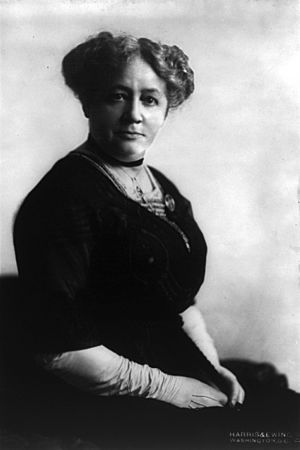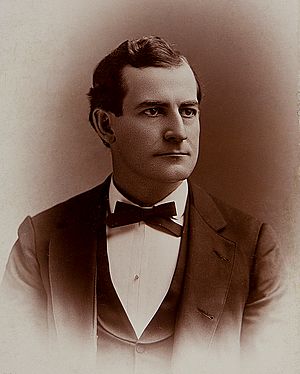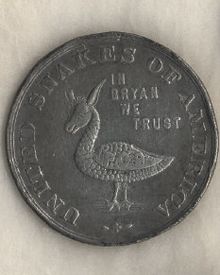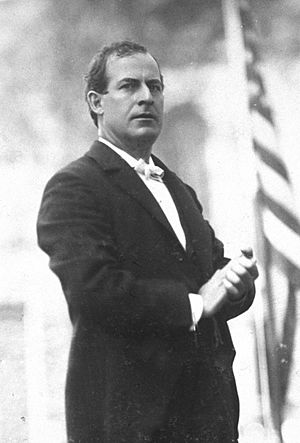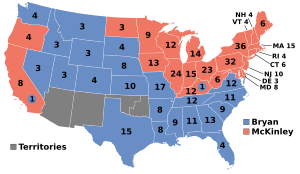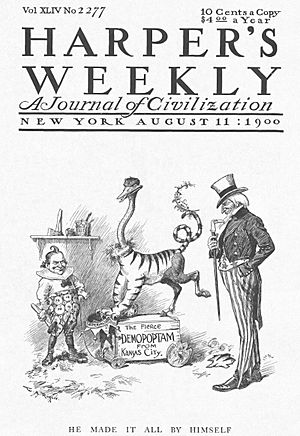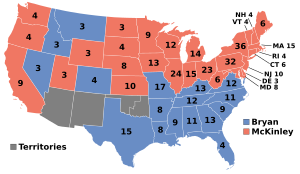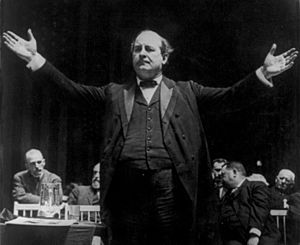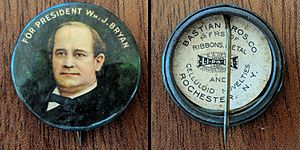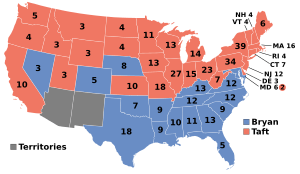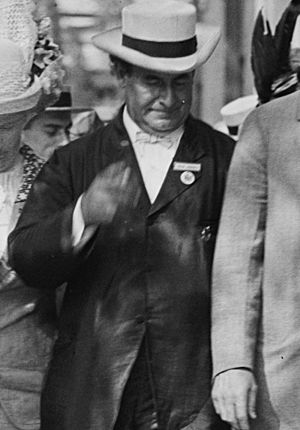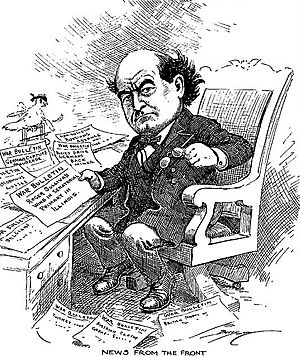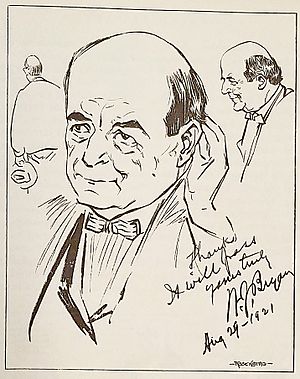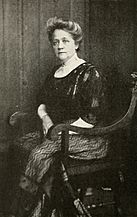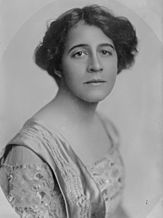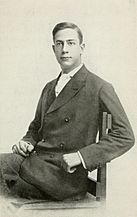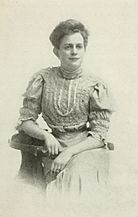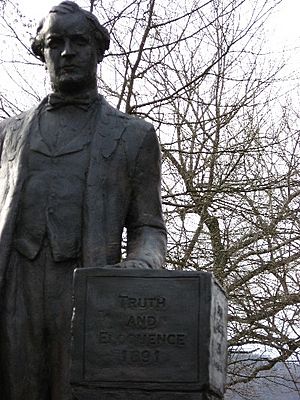William Jennings Bryan facts for kids
Quick facts for kids
William Jennings Bryan
|
|
|---|---|
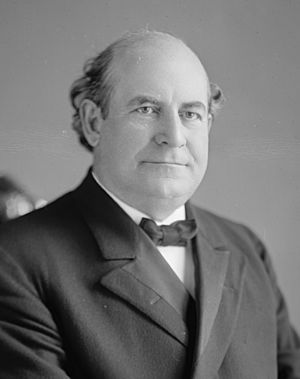
Bryan, c. 1910s
|
|
| 41st United States Secretary of State | |
| In office March 5, 1913 – June 9, 1915 |
|
| President | Woodrow Wilson |
| Preceded by | Philander C. Knox |
| Succeeded by | Robert Lansing |
| Member of the U.S. House of Representatives from Nebraska's 1st district |
|
| In office March 4, 1891 – March 3, 1895 |
|
| Preceded by | William James Connell |
| Succeeded by | Jesse Burr Strode |
| Personal details | |
| Born | March 19, 1860 Salem, Illinois, U.S. |
| Died | July 26, 1925 (aged 65) Dayton, Tennessee, U.S. |
| Resting place | Arlington National Cemetery |
| Political party | Democratic |
| Other political affiliations |
Populist |
| Spouse |
Mary Baird Bryan
(m. 1884) |
| Children | 3, including Ruth |
| Parent |
|
| Relatives | Charles Bryan (brother) |
| Education |
|
| Signature | |
William Jennings Bryan (March 19, 1860 – July 26, 1925) was an important American lawyer, speaker, and politician. He became a leading figure in the Democratic Party starting in 1896. He ran for President of the United States three times, in 1896, 1900, and 1908.
Bryan also served in the United States House of Representatives from 1891 to 1895. Later, he became the United States Secretary of State under President Woodrow Wilson. People often called him "The Great Commoner" because he believed in the wisdom of everyday people. He was also known as "The Boy Orator" due to his powerful speeches and being a young presidential candidate.
Born in Illinois, Bryan moved to Nebraska in the 1880s. He gained fame for his "Cross of Gold" speech, which supported using silver coins to help farmers and workers. He was a strong voice for progressive ideas, like helping ordinary people and regulating big businesses.
Contents
Early Life and Education
William Jennings Bryan was born in Salem, Illinois, on March 19, 1860. His parents were Silas Lillard Bryan and Mariah Elizabeth (Jennings) Bryan. His father, Silas, was a lawyer and a judge. He was also a strong supporter of the Democratic Party.
William was taught at home by his mother until he was ten years old. He showed a talent for public speaking from a very young age. When he was 14, he had a religious experience that he called the most important day of his life. At 15, he went to a private school called Whipple Academy.
After school, Bryan went to Illinois College. There, he continued to practice his public speaking skills in debates. He graduated at the top of his class in 1881. While in college, he met Mary Elizabeth Baird, and they married in 1884. Mary became a key part of Bryan's career, helping him with his speeches and writings.
Bryan then studied law at Union Law College in Chicago, which is now Northwestern University School of Law. After finishing law school in 1883, he worked for a law firm in Jacksonville. In 1887, he and Mary moved to Lincoln, hoping for more opportunities.
Early Political Career
Serving in Congress
In Lincoln, Bryan started a successful law practice. He also became involved in local politics, giving speeches for Democratic candidates. His strong speaking skills led him to run for Congress in the 1890 election.
Bryan supported lower taxes on imported goods, using silver coins alongside gold, and controlling the power of large companies called "trusts." He won the election, becoming only the second Democrat to represent Nebraska in Congress.
During this time, the Democratic Party was divided. One group wanted less government involvement, while another, which Bryan joined, wanted the government to help farmers and regulate big businesses. Bryan pushed for "free silver" (more silver coins) and a progressive income tax. This meant richer people would pay a higher percentage of their income in taxes.
Seeking the Senate Seat
Bryan won re-election to Congress in 1892. However, the country soon faced a major economic crisis called the Panic of 1893. President Grover Cleveland wanted to stop the government from buying silver, but Bryan fought against this. Even though he lost that fight, Bryan helped pass a law for the first federal income tax during peacetime.
Instead of running for Congress again in 1894, Bryan decided to run for the United States Senate. He also became the editor of a newspaper called Omaha World-Herald. Although he was popular, Republicans won most of the state elections in Nebraska, and Bryan lost his Senate race.
After this, Bryan traveled across the country, giving speeches to promote his ideas. He wanted to move the Democratic Party away from conservative policies. These speeches helped him become well-known before the next presidential election.
Presidential Candidate and Party Leader
The 1896 Presidential Election
By 1896, the idea of "free silver" was very popular in the Democratic Party. At the 1896 Democratic National Convention, Bryan helped write the party's goals. These goals criticized the current president and called the gold standard "un-American."
Bryan gave his famous "Cross of Gold" speech at the convention. In it, he argued that the debate over money was about democracy and helping the "common man." The speech was a huge success, and the crowd cheered for over half an hour.
The next day, Bryan was nominated for president on the fifth vote. At 36 years old, he became the youngest major party presidential candidate in U.S. history. The Populist Party also supported Bryan.
In the election, Bryan faced William McKinley, the Republican candidate. McKinley's campaign spent a lot of money and organized many events. Bryan, however, relied on his amazing speaking skills. He gave about 600 speeches in 27 states, reaching millions of people. He was the first presidential candidate to travel so widely.
Bryan tried to unite farmers, workers, and silver miners against banks and big businesses. Farmers liked free silver because it would raise prices for their crops. But city workers worried it would make things more expensive without raising their wages.
McKinley won the election with 51 percent of the popular vote. Bryan won the southern states and some western states. After his loss, many people still supported Bryan, and he remained a powerful figure in the Democratic Party.
The 1900 Presidential Election
After the Spanish–American War, Bryan became a strong opponent of American imperialism. This meant he was against the U.S. taking control of other countries, like the Philippines. He believed the U.S. should not become an empire.
At the 1900 Democratic National Convention, Bryan was nominated for president again without any real opposition. He decided to focus his campaign on anti-imperialism. He argued that the election was a fight "between democracy and plutocracy" (rule by the wealthy).
Bryan criticized the U.S. taking over the Philippines, comparing it to British rule over the Thirteen Colonies. He believed the U.S. should be a moral leader, not a conqueror. Many anti-imperialist groups supported Bryan.
Once again, McKinley's campaign had much more money and organization. Bryan continued his intense speaking tours, sometimes giving six hours of speeches a day. However, his anti-imperialism message did not connect with enough voters. McKinley won the election again, even gaining some western states that Bryan had won in 1896.
Between Presidential Campaigns (1901–1907)
After his 1900 defeat, Bryan returned to writing and speaking. He started his own weekly newspaper, The Commoner, which became very popular. It shared his political and religious ideas. In 1902, Bryan and his family moved into a large house in Lincoln, Nebraska, called Fairview.
Bryan continued to push for progressive reforms. These included a federal income tax, laws for safe food and drugs, and a ban on companies funding political campaigns. He also wanted people to directly elect senators and for local communities to own utilities.
In 1905, Bryan and his family traveled around the world, visiting 18 countries. He wrote about his experiences, sharing his thoughts on politics and labor laws. When he returned to the U.S. in 1906, he was seen as a likely candidate for president in 1908.
The 1908 Presidential Election
In 1908, Bryan again gained control of the Democratic Party and was nominated for president. He ran against William Howard Taft, who was supported by President Theodore Roosevelt.
Bryan's campaign focused on his long-held beliefs, like requiring banks to have deposit insurance. He also gained the support of the American Federation of Labor, a major union group. Bryan again traveled widely, giving many speeches.
However, Taft won the 1908 election easily. Bryan only won a few states outside the South. This was his third loss as a major party nominee. Bryan and Henry Clay are the only two people in U.S. history to receive electoral votes in three presidential elections but never win.
After this, Bryan remained an important voice in Democratic politics. He began to publicly support Prohibition, a movement to ban alcohol. He also supported women's suffrage, which gave women the right to vote.
Wilson Presidency
The 1912 Election
In 1912, the Republican Party was divided, giving Democrats a good chance to win the presidency. Bryan did not run himself, but he had a big say in choosing the nominee. He wanted to make sure a conservative candidate was not chosen.
Bryan supported New Jersey Governor Woodrow Wilson over other candidates. At the 1912 Democratic National Convention, Bryan helped pass a rule against nominating anyone connected to powerful bankers. Bryan then announced his support for Wilson, helping him win the nomination after many votes. Many people believed Bryan was key to Wilson's victory.
In the 1912 election, Wilson faced both President Taft and former President Roosevelt, who ran for a new party. Bryan campaigned for Wilson, especially in the West. The split in the Republican Party helped Wilson win the presidency.
Secretary of State
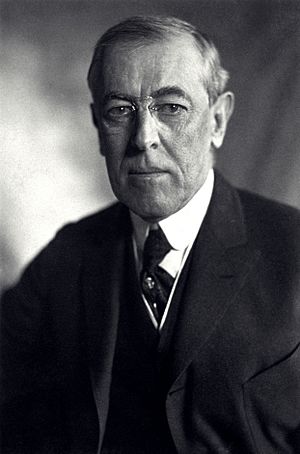
President Wilson chose Bryan to be his United States Secretary of State. This was a very important job. Bryan was a good choice because he had traveled widely, was popular in the party, and had supported Wilson.
Bryan and Wilson agreed on many goals, both in foreign policy and at home. With Bryan's help, Wilson passed laws to lower taxes on imports, create a progressive income tax, and establish the Federal Reserve System, which manages the nation's money.
Bryan worked to create treaties with other countries. These treaties required nations to discuss their disagreements before fighting. Twenty-nine countries signed these agreements. However, Bryan also oversaw U.S. military actions in countries like Haiti and Mexico.
When World War I started in Europe, Bryan strongly believed the U.S. should stay neutral. He tried to help negotiate an end to the war. But Wilson and others in the government started to favor the Allied Powers.
After a German U-boat sank the British ship RMS Lusitania in 1915, killing many Americans, anti-German feelings grew. Bryan believed that Americans traveling on British ships were taking unnecessary risks. He also thought the British blockade of Germany was as bad as Germany's U-boat attacks. When Wilson sent a strong protest to Germany, Bryan resigned on June 8, 1915, because he felt Wilson was being too harsh and risking war.
Later Career
Continued Political Involvement
After leaving his government job, Bryan continued to support Wilson's re-election in 1916. He gave many speeches defending Wilson's policies. When the U.S. entered World War I in 1917, Bryan offered to serve as a private soldier, but Wilson declined. Bryan still publicly supported the war effort.
Bryan spent much of his later years fighting for the eight-hour day for workers, a minimum wage, and the right for unions to strike. He also strongly supported women's suffrage and Prohibition. The 18th Amendment, banning alcohol, and the 19th Amendment, giving women the right to vote, were both passed in 1920.
Bryan did not run for president in 1920, saying he wanted to help the world ban alcohol and war. He attended the 1920 Democratic National Convention but was disappointed by the nominee.
In 1924, Bryan attended the 1924 Democratic National Convention as a delegate from Florida. He helped defeat a proposal to condemn the Ku Klux Klan, believing the group would soon disappear. He also strongly opposed Al Smith because Smith was against Prohibition. The Democrats nominated a conservative lawyer, John W. Davis, but chose Bryan's brother, Charles W. Bryan, as the vice presidential candidate. Bryan campaigned for his brother and the ticket, but they lost badly.
Anti-Evolution Activism
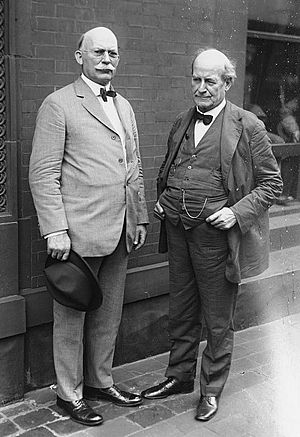
In his final years, Bryan became a leading figure in a movement against teaching Charles Darwin's theory of evolution in public schools. He believed that evolution went against the Biblical account of creation. He also worried that applying Darwin's ideas to society (social Darwinism) could lead to hatred and stop poor people from improving their lives.
Bryan called for laws to ban the teaching of evolution as a fact in public schools. He suggested that it could be taught as a "hypothesis" (an idea to be tested) but not as proven fact. Only a few southern states passed such laws.
The Scopes Trial
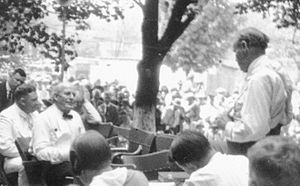
From July 10 to 21, 1925, Bryan took part in the famous Scopes Trial. A teacher named John T. Scopes was accused of breaking a Tennessee law that banned teaching evolution in public schools. The defense lawyer, Clarence Darrow, argued that the law was unconstitutional.
Bryan defended the law, saying that parents should choose what schools teach. He argued that Darwinism was just a "hypothesis" and that intellectuals were trying to challenge the Bible's moral teachings. Darrow questioned Bryan about his belief in the Bible's literal words.
Scopes was found guilty and fined $100. The trial was widely reported, and some newspapers criticized Bryan's performance. Bryan had planned to give a final speech, which he later published. In it, he wrote that "science is a magnificent material force, but it is not a teacher of morals."
Death
A few days after the Scopes Trial, Bryan gave several speeches in Tennessee. On Sunday, July 26, 1925, he died in his sleep from a stroke after attending a church service.
Bryan's body was taken by train to Washington, D.C.. He was buried at Arlington National Cemetery. His gravestone reads, "Statesman, yet Friend to Truth! Of Soul Sincere, in Action Faithful, and in Honor Clear" and "He Kept the Faith."
Family
Bryan was married to Mary until his death in 1925. Mary was a very important advisor to him. She even passed the bar exam to become a lawyer and learned German to help his career. She was buried next to Bryan after her death in 1930.
William and Mary had three children: Ruth (1886–1954), William Jr. (1889–1978), and Grace Dexter (1891–1945). Ruth later became a member of Congress and an ambassador. William Jr. became a lawyer and held federal jobs. Grace wrote a book about her father. William's younger brother, Charles, was also a key supporter and a politician himself, serving as mayor of Lincoln and governor of Nebraska.
Legacy and Impact
Historical Reputation
People have had mixed opinions about William Jennings Bryan throughout history. Some see him as a pioneer of social change, while others remember him mostly for the Scopes Trial.
Historians agree that Bryan was one of the most influential politicians of the Progressive Era. This was a time of major social and political reform in the U.S. Some even say that only presidents like Theodore Roosevelt and Woodrow Wilson had a greater impact on politics during that period.
For many years, some scholars and journalists described Bryan as a simple-minded person. However, more recently, experts have started to appreciate his reasons and goals, especially his opposition to ideas like eugenics.
Prominent figures from both political parties have praised Bryan. Former President Harry S. Truman called him "a great one." He also said that Bryan "kept liberalism alive" in the country.
Memorials
Many places and things are named after William Jennings Bryan. His home in Nebraska, the William Jennings Bryan House, is a U.S. National Historic Landmark. His birthplace in Salem, Illinois, also has a museum and a statue of him.
A statue of Bryan once represented Nebraska in the National Statuary Hall in the United States Capitol. He was also honored with a postage stamp by the United States Postal Service.
Bryan County, Oklahoma, Bryan Medical Center in Lincoln, Nebraska, and Bryan College in Dayton, Tennessee, are all named in his honor.
See also
 In Spanish: William Jennings Bryan para niños
In Spanish: William Jennings Bryan para niños
- Fundamentalist–Modernist Controversy
- Progressive Era
- The Rhetorical Presidency
 | Dorothy Vaughan |
 | Charles Henry Turner |
 | Hildrus Poindexter |
 | Henry Cecil McBay |


